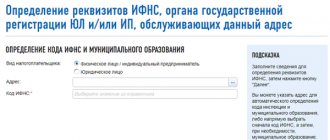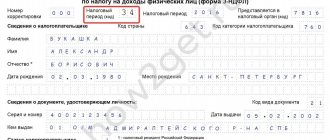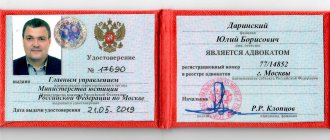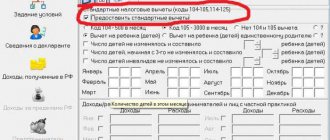Inspectorate of the Federal Tax Service of the Central Administrative District (CAO)
| Federal Tax Service number | Address | Secretary's phone |
| Federal Tax Service No. 1 | 105064, Moscow, st. Zemlyanoy Val, 9 | |
| Federal Tax Service No. 2 | 129110, Moscow, st. B. Pereyaslavskaya, 16 | |
| Federal Tax Service No. 3 | 123100, Moscow, st. Anatoly Zhivova, 2, building 6 | |
| Federal Tax Service No. 4 | 119048, Moscow, st. Dovatora, 12, bldg. 2, page 5 | |
| Federal Tax Service No. 5 | 105064, Moscow, st. Zemlyanoy Val, 9 | |
| Federal Tax Service No. 6 | 115191, Moscow, st. B. Tulskaya, 15 | |
| Federal Tax Service No. 7 | 105064, Moscow, st. Zemlyanoy Val, 9 | |
| Federal Tax Service No. 8 | 129110, Moscow, Bolshaya Pereyaslavskaya, 16 | |
| Federal Tax Service No. 9 | 109147, Moscow, Marksistskaya st., 34, building 6 - for postal items Moscow, Volgogradsky Prospekt, 42, bldg. 26 – reception of taxpayers | |
| Federal Tax Service No. 10 | 115191, Moscow, st. B. Tulskaya, 15 |
Inspections of the Federal Tax Service of the Northern Administrative District (NAO)
| Number Federal Tax Service | Address | Secretary's phone |
| Federal Tax Service No. 13 | 105064, Moscow, st. Zemlyanoy Val, 9 | |
| Federal Tax Service No. 14 | 125057, Moscow, Chapaevsky lane, 8 (personal physical education institution) 125284, Moscow, 2nd Botkinsky proezd, 8, building 1 (individual and legal entities) | |
| Federal Tax Service No. 43 | 125493 Moscow, st. Smolnaya, 25 a |
Working hours of tax inspectorates
In order to understand the operating mode of the tax office, it is necessary to determine which tax office we are going to contact. There are two types of inspections: district tax inspectorates, interdistrict inspections. Depending on the type, tax offices will have slightly different operating hours and reception times for citizens. Please also note that almost all tax offices have an operating room, the opening hours of which differ from the opening hours of the inspection.
Work of district inspectorates
District tax inspectorates are designed to provide territorial service to tax entities. The operating hours of such inspections are presented in the table.
Inspections of the Federal Tax Service of the Western Administrative District (JSC)
Federal Tax Service number | Address | Secretary's phone |
| Federal Tax Service No. 29 | 119454, Moscow, st. Lobachevskogo, 66a - UR faces 119618, Moscow, st. 50 let Oktyabrya, 6 – Individual, individual entrepreneur | |
| Federal Tax Service No. 30 | 121433, Moscow, st. M. Filevskaya, 10, building 3 | |
| Federal Tax Service No. 31 | 121351, Moscow, st. Molodogvardeyskaya, 21, building 1 |
No. 38 Which capital inspection is safer to register with?
(based on materials from the newspaper “Accounting, Taxes, Law”) Which metropolitan inspectorate is safer to register with?Andrey Karpov, UNP expert
Of all the capital inspections, it is safest to be registered with the Federal Tax Service Inspectorate No. 4 for the Central Administrative District. Companies registered in it have the greatest overall chance of avoiding an invitation to a salary commission, passing an on-site audit with minimal losses, not encountering an in-depth “camera chamber” and fending off claims from tax authorities, if they are nevertheless presented. On the contrary, MIFNS No. 37 for the Southern Administrative District creates the most problems for its “wards”. This conclusion can be drawn from the security rating of Moscow tax inspectorates prepared by UNP.
The rating is based on the results of the capital's Federal Tax Service for the second quarter, which were recently reviewed by the Moscow Tax Department at a special meeting. We have received materials from this event. They show the assessments that each inspection received from the capital's Federal Tax Service on 67 indicators of its work.
Not all of these indicators directly relate to the relationship between tax authorities and taxpayers. Example: “Mastering the limits of allocated funds” (indicator No. 11). But there are also those that show how much the inspection bothers the companies registered with it with its attention, how much this attention costs them and what are their chances of defending their case in case of disagreements with the inspectors. We selected five such indicators on the basis of which we based our rating.
Chances of avoiding a salary commission.
The document we received provides data on the share of taxpayers in each inspection “personally covered by measures to legalize wages.” Obviously, the more “uncovered” there are, the more peaceful the life of companies in a given Federal Tax Service, all other things being equal.
The chances of an on-site inspection are “little bloody.”
Namely, with additional charges of no more than 50 thousand rubles.
Degree of security of desk checks.
We are talking about the share of so-called passive control in the total amount of additional accruals based on the results of “camera cameras”. Passive control is the automatic accrual of penalties by a program established by the Federal Tax Service in the event of a delay in tax payment by a company. The greater the share of such passive control, the less the inspectorate bothers itself with in-depth desk checks, being content with computer-based additional charges. Which, of course, benefits taxpayers.
Chances of fighting off inspection claims without trial.
This is the share of taxpayer complaints against the inspectorate that were satisfied by the capital's tax department.
Chances of winning a dispute with the inspectorate in court.
The share of tax disputes won by taxpayers against a given inspectorate in court, in their total number. The list of Federal Tax Service Inspectors, ranked by each of these characteristics, is given on page 3 of the Moscow tab. And on this page in the box on the right is the final security rating of tax inspectorates based on the sum of all five indicators.
BY THE WAY.
The rating points are calculated as follows. The percentages on page 3 have been converted to numbers. For example, the value of 96.1 percent is taken equal to 96.1 points. The scores for all five indicators are summed up and divided by five. Thus, the average security score for each Federal Tax Service was obtained.
“The rating is based on the results of the capital’s Federal Tax Service for the second quarter, which were recently reviewed by the Moscow Tax Department at a special meeting.”
Inspection safety rating 1 Federal Tax Service Inspectorate No. 4 56 points 2 Federal Tax Service Inspectorate No. 26 52 points 3 Federal Tax Service Inspectorate No. 13 52 points 4 Federal Tax Service Inspectorate No. 50 49 points 5 Federal Tax Service Inspectorate No. 30 48 points 6 Federal Tax Service Inspectorate No. 48 47 points 7 Federal Tax Service Inspectorate No. 28 46 points 8 Federal Tax Service Inspectorate No. 5 44 points 9 Federal Tax Service Inspectorate No. 19 44 points 10 MIFTS No. 47 44 points 11 Federal Tax Service Inspectorate No. 33 43 points 12 Federal Tax Service Inspectorate No. 29 43 points 13 Federal Tax Service Inspectorate No. 43 43 points 14 Federal Tax Service Inspectorate No. 25 41 points 15 Federal Tax Service Inspectorate No. 6 41 points 16 Federal Tax Service Inspectorate No. 10 40 points 17 Federal Tax Service Inspectorate No. 8 40 points 18 Federal Tax Service Inspectorate No. 1 39 points 19 Federal Tax Service Inspectorate No. 22 39 points 20 Federal Tax Service Inspectorate No. 45 39 points 21 Federal Tax Service Inspectorate No. 27 38 points 22 Federal Tax Service Inspectorate No. 20 36 points 23 Federal Tax Service Inspectorate No. 36 35 points 24 Federal Tax Service Inspectorate No. 23 34 points 25 Federal Tax Service Inspectorate No. 9 33 points 26 Federal Tax Service Inspectorate No. 3 32 points 27 Federal Tax Service Inspectorate No. 7 32 points 28 Federal Tax Service Inspectorate No. 24 31 points 29 Federal Tax Service Inspectorate No. 34 30 points 30 Federal Tax Service Inspectorate No. 31 28 points 31 Federal Tax Service Inspectorate No. 49 28 points 32 Federal Tax Service Inspectorate No. 14 28 points 33 Federal Tax Service Inspectorate No. 16 28 points 34 Federal Tax Service Inspectorate No. 17 27 points 35 Federal Tax Service Inspectorate No. 18 27 points 36 Federal Tax Service Inspectorate No. 2 27 points 37 Federal Tax Service Inspectorate No. 15 27 points 38 Federal Tax Service Inspectorate No. 35 26 points 39 Federal Tax Service Inspectorate No. 21 26 points 40 Federal Tax Service Inspectorate No. 32 24 points 41 Federal Tax Service Inspectorate No. 37 20 points Nearest Tax authorities' plans to “whiten” wages
Lyubov Garanina, UNP correspondent
The capital's tax authorities are going to make public a list of those companies that, despite the work of the “salary” commission, refused to raise salaries.
True, if you believe the statistics of the capital's tax department, there are few disobedient ones. For 9 months of 2007, “salary” commissions covered more than 21 thousand.
Moscow companies (88.6 percent of those selected for special tax control). Of these, according to tax officials, 95.8 percent had their salaries increased.
Those who did not respond to the recommendations to increase their salaries will not be invited back to the conversation - they will be subject to on-site inspections. Audits are also threatened against those who raised their salaries slightly, promising to increase employee income later: “We gave many companies time to develop if they presented us with a business plan. Now we will compare their figures with tax reporting data, and if discrepancies are found, we will have to visit the taxpayer.”
Inspectors are also hoping for one more measure of influence. “In addition to persuasion, we will apparently have to resort to more stringent measures - the open publication of lists of such people in the capital’s tax department. Tax officials recall with satisfaction the resonance caused by the publication of a list of unprofitable companies on the website of the Federal Tax Service. “The effectiveness of publicity is a good tool for working with disobedient payers,” the department believes.
NEWS
What's new in inspections
Inspectorate of the Federal Tax Service of Russia No. 7 for the Central Administrative District of Moscow
Requires
submit documents confirming the right to occupy the premises at your address from everyone who wishes to receive extracts from the Unified State Register of Legal Entities database and copies of constituent documents. Moreover, tenants must submit not only the lease agreement, but also a copy of the landlord’s certificate of ownership. Extracts are issued in office 111.
Reports
that all information regarding registration and deregistration of cash registers, replacement of EKLZ can be found by phone. 250-95-37.
Calls
representatives of all companies that have submitted VAT refunds to the desk inspection department No. 6. The inspectorate urges everyone who reported VAT amounts on line 050 1.1 of the VAT return, without waiting for a special invitation, to come to room 104 “to submit documents.”
Inspectorate of the Federal Tax Service of Russia No. 8 for the Central Administrative District of Moscow
Summons
It is mandatory to indicate the following parameters in requests to obtain a certificate of no debt: TIN and KPP of the organization; contact number; the purpose of obtaining the certificate; record “Issue the certificate in hand.”
Writes down
for reconciliation of tax payments by phone. 647-05-48.
Requires
, so that taxpayers who declared losses in their income tax return in 2006 appear at the desk audit department No. 2 (rooms 331, 332, 333). Phone: 647-05-18.
Inspectorate of the Federal Tax Service of Russia No. 9 for the Central Administrative District of Moscow
Accepts
requests for extracts from the Unified State Register of Legal Entities and copies of constituent documents from 9.00 to 15.00 without interruption. Ready documents are issued from 15.00 to 18.00 at window No. 8.
When going for an extract, you need to take with you your passport, power of attorney, and a second copy of the application with an inspection mark.
Obliges
Representatives of companies who wish to receive copies of charters and constituent documents certified by the inspection must confirm their address with a copy of the lease agreement along with a copy of the landlord's certificate of ownership. Moreover, this certificate must be certified by the owner of the premises. But that’s not all: the inspection requires you to provide copies of the landlord’s constituent documents.
Inspectorate of the Federal Tax Service of Russia No. 10 for the Central Administrative District of Moscow
Asks
submit to the office requests for extracts from the Unified State Register of Legal Entities, certificates of the current account of a legal entity, duplicates of certificates of registration of legal entities and individuals in case of their loss, certificates of the status of a legal entity.
Pays attention
that payments are reconciled daily in the 107th inspection room.
The pass can be obtained at window No. 7 of the operating room. Tax authorities do not have time to collect taxes from citizens
Marina Basovich, UNP correspondent
Tax officials are not giving up attempts to improve the collection of property taxes from citizens: in early October, special working groups were created for this purpose in all capital IFTS (by internal order of the tax department, a copy of which is available in the editorial office). However, inspectors doubt that the collection plans put forward by their superiors are realistic.
BY NUMBERS.
In total, as of September 1, residents of the capital owed the budget property taxes in the amount of 3,393,034,000 rubles.
The maximum task that management has set for the inspections is to deal with existing debtors by the end of this year. The Federal Tax Service has drawn up a plan for each inspection for generating documents for going to court, evenly distributing the amount of current debt over three months.
But the management’s hopes are ready to justify only those inspections that have few “physicist” debtors. But those on whom many debtors “hang” (IFTS No. 15, 23, 26, 29, 33) do not share the enthusiasm of their colleagues. “It takes a lot of time to collect a package of documents to go to court. The working groups will not be able to change anything: they will simply increase control over us, complains one of the inspectorates. “If we added a new department and recruited additional staff, then there would be results, but we still won’t be able to keep up.”
Companies that own housing will be required to pay property taxes
Galina Timofeeva, UNP correspondent
Starting next year, metropolitan companies that own apartments and other housing facilities will be required to pay corporate property tax. On October 10, deputies of the Moscow City Duma approved in the second and final reading such amendments to the Moscow Law of November 5, 2003 No. 64.
The purpose of the bill was explained by its co-author, Moscow City Duma deputy Alexander Krutov: “Owners of apartment buildings, in the absence of buyers, often rent out apartments for offices or other service premises without paying property taxes.” Therefore, from January 1, only housing that is used exclusively for its intended purpose, that is, occupied by residents under a rental or perpetual use agreement, will be exempt from the tax, the rate of which is 2.2 percent.
The Moscow Tax Department, which took part in the discussion of the bill, is already making plans for inspections of homeowners. “There will most likely be no unscheduled on-site inspections of companies owning apartments in Moscow. Such audits require a large amount of work, so the tax authorities will limit themselves to requesting additional documents during desk audits, the department of resource, property and other taxes of the Federal Tax Service in Moscow told UNP. “Organizations will have to document that they are using the premises for their intended purpose, that is, provide us with a rental agreement.”
You can liquidate a company in Moscow without verification
Evgenia Zolotareva, UNP correspondent
The capital's tax authorities do not have time to check companies in connection with their liquidation: 40 percent of the 788 firms that decided to close in the first half of this year were deleted from the Unified State Register of Legal Entities without an audit. This situation does not suit the tax authorities, who see liquidation as an attempt to “bury” the company along with all the violations it has committed over the years of operation. Reason to believe so: 85 percent of the audits of liquidated organizations that tax officials managed to carry out turned out to be effective.
The tax authorities have two months to conduct an audit from the date of publication of the notice of the upcoming liquidation. If inspectors do not have time to file tax claims within this period, they must, no matter what, delete the organization from the Unified State Register of Legal Entities (Clause 2, Article 22 of the Federal Law of 08.08.01 No. 129-FZ).
Which Federal Tax Service Inspectorate is it safer to register with*
Chances of avoiding a visit to the salary commission** MIFTS No. 50 96.1% MIFTS No. 47 87.5% IFTS No. 34 86.8% IFTS No. 5 84.2% IFTS No. 33 83.6% MIFTS No. 48 81.0% IFTS No. 29 80.2% Federal Tax Service Inspectorate No. 13 79.5% Federal Tax Service Inspectorate No. 15 79.3% Federal Tax Service Inspectorate No. 45 78.5% Federal Tax Service Inspectorate No. 19 77.0% Federal Tax Service Inspectorate No. 4 71.7% Federal Tax Service Inspectorate No. 10 71.3% Federal Tax Service Inspectorate No. 20 70.2% Inspectorate of the Federal Tax Service No. 28 69.9% Inspectorate of the Federal Tax Service No. 26 67.9% Inspectorate of the Federal Tax Service No. 1 67.9% Inspectorate of the Federal Tax Service No. 14 66.3% Inspectorate of the Federal Tax Service No. 25 65.8% Inspectorate of the Federal Tax Service No. 8 64.6% Inspectorate of the Federal Tax Service No. 9 63.4% Moscow average 62.4% Federal Tax Service Inspectorate No. 27 61.1% Federal Tax Service Inspectorate No. 23 60.2% Federal Tax Service Inspectorate No. 49 58.8% Federal Tax Service Inspectorate No. 43 57.7% Federal Tax Service Inspectorate No. 6 57.4% Federal Tax Service Inspectorate No. 37 57.1% Inspectorate of the Federal Tax Service No. 7 56.8% Inspectorate of the Federal Tax Service No. 36 56.5% Inspectorate of the Federal Tax Service No. 30 55.6% Inspectorate of the Federal Tax Service No. 24 55.4% Inspectorate of the Federal Tax Service No. 31 50.2% Inspectorate of the Federal Tax Service No. 22 46.7% Inspectorate of the Federal Tax Service No. 21 46 .4% Inspectorate of the Federal Tax Service No. 32 46.2% Inspectorate of the Federal Tax Service No. 2 33.1% Inspectorate of the Federal Tax Service No. 17 26.0% Inspectorate of the Federal Tax Service No. 18 23.6% Inspectorate of the Federal Tax Service No. 16 16.8% Inspectorate of the Federal Tax Service No. 3 9.2% Inspectorate of the Federal Tax Service No. 35 8, 0%
** The share of companies not involved in the salary whitening campaign in the total number of organizations registered with the inspectorate. Chances of an on-site inspection are “little”** Inspectorate of the Federal Tax Service No. 28 54.9% Inspectorate of the Federal Tax Service No. 5 46.7% Inspectorate of the Federal Tax Service No. 20 37.7% Inspectorate of the Federal Tax Service No. 31 33.8% Inspectorate of the Federal Tax Service No. 3 33.3% Inspectorate of the Federal Tax Service No. 26 32, 9% Inspectorate of the Federal Tax Service No. 30 31.3% Inspectorate of the Federal Tax Service No. 4 30.2% Inspectorate of the Federal Tax Service No. 32 27.8% Inspectorate of the Federal Tax Service No. 25 27.6% Inspectorate of the Federal Tax Service No. 35 26.4% Inspectorate of the Federal Tax Service No. 18 25.5% Inspectorate of the Federal Tax Service No. 21 25.0 % Federal Tax Service Inspectorate No. 37 23.4% Federal Tax Service Inspectorate No. 17 23.3% Federal Tax Service Inspectorate No. 8 21.8% Federal Tax Service Inspectorate No. 1 21.7% Federal Tax Service Inspectorate No. 34 21.7% Federal Tax Service Inspectorate No. 14 21.0% Moscow average 20.5 % Inspectorate of the Federal Tax Service No. 9 20.3% Inspectorate of the Federal Tax Service No. 36 20.0% Inspectorate of the Federal Tax Service No. 10 19.2% Inspectorate of the Federal Tax Service No. 22 19.0% Inspectorate of the Federal Tax Service No. 29 18.2% Inspectorate of the Federal Tax Service No. 23 18.2% Inspectorate of the Federal Tax Service No. 13 17.0% Federal Tax Service Inspectorate No. 6 16.0% Federal Tax Service Inspectorate No. 27 15.8% Federal Tax Service Inspectorate No. 19 14.0% Federal Tax Service Inspectorate No. 33 12.5% Federal Tax Service Inspectorate No. 16 12.4% Federal Tax Service Inspectorate No. 47 12.1% Federal Tax Service Inspectorate No. 43 11.1% Federal Tax Service Inspectorate No. 24 10.0% Federal Tax Service Inspectorate No. 7 9.3% Federal Tax Service Inspectorate No. 15 5.8% Federal Tax Service Inspectorate No. 45 5.6% Federal Tax Service Inspectorate No. 2 5.0% Federal Tax Service Inspectorate No. 48 4.3% Federal Tax Service Inspectorate No. 50 3.1% Federal Tax Service Inspectorate No. 2 49 0.0%
** Share of on-site inspections that resulted in additional charges of up to 50 thousand rubles, in the total number of inspections. Degree of security of desk audits** Federal Tax Service Inspectorate No. 13 60.4% Federal Tax Service Inspectorate No. 4 58.4% Federal Tax Service Inspectorate No. 50 52.8% Federal Tax Service Inspectorate No. 24 50.8% Federal Tax Service Inspectorate No. 30 50.7% Federal Tax Service Inspectorate No. 48 50.3% Federal Tax Service Inspectorate No. 26 50.2% Inspectorate of the Federal Tax Service No. 8 48.5% Inspectorate of the Federal Tax Service No. 33 48.2% Inspectorate of the Federal Tax Service No. 6 44.5% Inspectorate of the Federal Tax Service No. 17 43.5% Inspectorate of the Federal Tax Service No. 16 42.1% Inspectorate of the Federal Tax Service No. 25 41.1% Inspectorate of the Federal Tax Service No. 20 39.0% Federal Tax Service Inspectorate No. 32 38.0% Federal Tax Service Inspectorate No. 49 37.8% Federal Tax Service Inspectorate No. 47 37.8% Federal Tax Service Inspectorate No. 1 37.4% Federal Tax Service Inspectorate No. 21 35.0% Federal Tax Service Inspectorate No. 10 33.5% Federal Tax Service Inspectorate No. 22 33 .4% Federal Tax Service Inspectorate No. 34 33.2% Federal Tax Service Inspectorate No. 19 29.1% Federal Tax Service Inspectorate No. 23 28.2% Moscow average 27.5% Federal Tax Service Inspectorate No. 7 27.1% Federal Tax Service Inspectorate No. 43 24.0% Federal Tax Service Inspectorate No. 9 22 .0% Federal Tax Service Inspectorate No. 35 20.5% Federal Tax Service Inspectorate No. 18 17.9% Federal Tax Service Inspectorate No. 31 16.7% Federal Tax Service Inspectorate No. 29 15.0% Federal Tax Service Inspectorate No. 45 14.8% Federal Tax Service Inspectorate No. 28 14.7% Federal Tax Service Inspectorate No. 14 12, 2% Inspectorate of the Federal Tax Service No. 27 12.2% Inspectorate of the Federal Tax Service No. 2 11.3% Inspectorate of the Federal Tax Service No. 3 9.9% Inspectorate of the Federal Tax Service No. 5 6.7% Inspectorate of the Federal Tax Service No. 37 6.1% Inspectorate of the Federal Tax Service No. 15 5.0% Inspectorate of the Federal Tax Service No. 36 3.0 %
** The share of “passive control” in additional accruals based on the results of desk audits (for more details, see page 1 of the Moscow tab). Chances of fighting off inspection claims without trial** Federal Tax Service Inspectorate No. 43 33.3% Federal Tax Service Inspectorate No. 24 26.7% Federal Tax Service Inspectorate No. 50 22.2% Federal Tax Service Inspectorate No. 18 22.2% Federal Tax Service Inspectorate No. 29 18.8% Federal Tax Service Inspectorate No. 22 18.8 % Inspectorate of the Federal Tax Service No. 4 18.2% Inspectorate of the Federal Tax Service No. 20 18.2% Inspectorate of the Federal Tax Service No. 31 18.2% Inspectorate of the Federal Tax Service No. 9 17.9% Inspectorate of the Federal Tax Service No. 23 17.4% Inspectorate of the Federal Tax Service No. 36 14.3% Inspectorate of the Federal Tax Service No. 10 11.8% Inspectorate of the Federal Tax Service No. 26 11.1% Inspectorate of the Federal Tax Service No. 13 11.1% Inspectorate of the Federal Tax Service No. 30 11.1% Inspectorate of the Federal Tax Service No. 25 10.5% Inspectorate of the Federal Tax Service No. 19 10.0% Inspectorate of the Federal Tax Service No. 3 10.0% Inspectorate of the Federal Tax Service No. 2 9.5% B Moscow average 9.4% Federal Tax Service Inspectorate No. 14 9.1% Federal Tax Service Inspectorate No. 45 7.7% Federal Tax Service Inspectorate No. 5 7.4% Federal Tax Service Inspectorate No. 27 5.6% Federal Tax Service Inspectorate No. 33 5.0% Federal Tax Service Inspectorate No. 48 0.0% Federal Tax Service Inspectorate No. 28 0.0% MIFTS No. 47 0.0% IFTS No. 6 0.0% IFTS No. 8 0.0% IFTS No. 1 0.0% IFTS No. 7 0.0% IFTS No. 34 0.0% MIFTS No. 49 0.0% Federal Tax Service Inspectorate No. 16 0.0% Federal Tax Service Inspectorate No. 17 0.0% Federal Tax Service Inspectorate No. 15 0.0% Federal Tax Service Inspectorate No. 35 0.0% Federal Tax Service Inspectorate No. 21 0.0% Federal Tax Service Inspectorate No. 32 0.0% Federal Tax Service Inspectorate No. 37 0.0%
** Percentage of taxpayer complaints against the inspection that were satisfied by the Moscow Tax Department. Chances of winning a tax dispute with the inspectorate in court** Federal Tax Service Inspectorate No. 4 100.0% Federal Tax Service Inspectorate No. 26 100.0% Federal Tax Service Inspectorate No. 48 100.0% Federal Tax Service Inspectorate No. 3 100.0% Federal Tax Service Inspectorate No. 27 94.8% Federal Tax Service Inspectorate No. 30 92, 2% Federal Tax Service Inspectorate No. 28 91.7% Federal Tax Service Inspectorate No. 19 90.5% Federal Tax Service Inspectorate No. 13 89.7% Federal Tax Service Inspectorate No. 45 88.9% Federal Tax Service Inspectorate No. 43 86.5% Federal Tax Service Inspectorate No. 6 84.6% Federal Tax Service Inspectorate No. 47 82.1 % Federal Tax Service Inspectorate No. 36 81.7% Federal Tax Service Inspectorate No. 29 80.9% Federal Tax Service Inspectorate No. 22 77.8% Federal Tax Service Inspectorate No. 5 77.5% Federal Tax Service Inspectorate No. 2 75.0% Federal Tax Service Inspectorate No. 35 75.0% Federal Tax Service Inspectorate No. 50 71.4% Inspectorate of the Federal Tax Service No. 1 68.8% Inspectorate of the Federal Tax Service No. 16 68.4% Inspectorate of the Federal Tax Service No. 33 66.7% Inspectorate of the Federal Tax Service No. 7 66.7% Inspectorate of the Federal Tax Service No. 10 63.4% Inspectorate of the Federal Tax Service No. 8 63.0% Inspectorate of the Federal Tax Service No. 25 59.1% B Moscow average 48.9% Federal Tax Service Inspectorate No. 23 45.6% Federal Tax Service Inspectorate No. 18 45.4% Federal Tax Service Inspectorate No. 17 44.4% Federal Tax Service Inspectorate No. 49 43.6% Federal Tax Service Inspectorate No. 15 42.4% Federal Tax Service Inspectorate No. 9 42.1% Federal Tax Service Inspectorate No. 14 31.3% Inspectorate of the Federal Tax Service No. 31 22.6% Inspectorate of the Federal Tax Service No. 21 21.6% Inspectorate of the Federal Tax Service No. 20 15.4% Inspectorate of the Federal Tax Service No. 37 14.5% Inspectorate of the Federal Tax Service No. 24 11.8% Inspectorate of the Federal Tax Service No. 32 8.9% Inspectorate of the Federal Tax Service No. 34 6.7%
** The share of tax disputes won by taxpayers against a given inspectorate in court, in their total number. * Additional data for the safety rating of the capital's inspectorates.
HOTLINE
Unified social tax
Answers questions
Lyubov Konstantinova (FTS of Russia for Moscow)*
The “pension” registration number may not be indicated on the payment slip.
— Should our company indicate our registration number with the Pension Fund on payment slips for the payment of unified social tax and contributions to compulsory pension insurance?
— The rules for filling out settlement documents for the transfer of taxes and fees to the budget (approved by order of the Ministry of Finance of Russia dated November 24, 2004 No. 106n. — Editor’s note) do not require this. However, to identify payments, which in this case go both to the tax authorities and to the Pension Fund, in the payment document in the “payment name” field, it is still advisable to indicate the number that your company was assigned when registering with the territorial body of the Pension Fund.
— And if there is no such information in the payment slip, will payments still be credited to the required budget?
— Yes, if all details are filled out correctly, the received amounts will be reflected in the budget settlement card and the Pension Fund database.
When “imputed”, payments from net profit are subject to pension contributions
— We combine the general regime with UTII. We pay employees the cost of food out of net profit. Are such payments subject to contributions to compulsory pension insurance?
— When we are talking about payments in favor of employees who are engaged in activities under the general regime, then the unified social tax and contributions for compulsory pension insurance do not need to be subject to such payments. The basis is paragraph 3 of Article 236 of the Tax Code and paragraph 2 of Article 10 of the Federal Law of December 15, 2001 No. 167-FZ “On Compulsory Pension Insurance in the Russian Federation.”
— What about payments in favor of employees who are engaged in activities on UTII?
— These payments must be subject to contributions to compulsory pension insurance. For activities that are transferred to UTII, your company does not pay income tax. This means that the exemption under paragraph 3 of Article 236 of the Code does not apply to payments in favor of employees who are engaged in activities on UTII. Therefore, payment for meals in favor of such employees should be subject to contributions for compulsory pension insurance in the general manner on the basis of paragraph 1 of Article 237 of the Code.
EDITOR'S COMMENT.
Unlike officials, the courts are of the opinion that payments to employees from net profit are not subject to contributions for compulsory pension insurance, regardless of the tax regime applied by the company (see, for example, the resolution of the Federal Arbitration Court of the Central District dated July 24, 2006 No. A68-AP -506/14-04). You can read about this in detail in UNP No. 31, 2007, page 7 “Arbitration cases that will convince the inspector that you are right.”
Premiums not provided for in the contract are not subject to unified social tax.
— For achieving certain results, for example, an increase in sales volumes, an increase in the sales market, the conclusion of a profitable contract, by decision of the founders, the general director is sometimes paid a bonus. Should it be subject to unified social tax?
— It all depends on whether you take these payments into account as income tax expenses. Does your collective agreement or employment contract with your manager provide for the payment of such bonuses?
- As far as I know, no.
— This means that, as a general rule, such payments, despite the fact that they are related to the company’s production activities, should not be taken into account in income tax expenses. The basis is paragraph 21 of Article 270 of the Tax Code. Consequently, such payments on the basis of paragraph 3 of Article 236 of the Code are not subject to the unified social tax and insurance contributions to the Pension Fund.
The procedure for calculating remuneration for driver services for the unified social tax does not matter
— We recently rented a car with a crew. According to the terms of the agreement, the rental payment and the fee for driving the car are separated, but are determined depending on the mileage of the car. How much should we pay UST in this case?
— From the amount you pay for driving services. There is no need to pay UST on the rent amount. Payments under agreements related to the transfer of rights to use property are not recognized as an object under the Unified Social Tax. This is established by paragraph 1 of Article 236 of the Tax Code.
— Our contract says that the cost of one kilometer is 6 rubles, of which 2 rubles are the management fee, and 4 rubles are the rental fee. Do I understand correctly that we will still only have to pay UST for 2 rubles? It turns out that such wording in the contract is acceptable and allows tax to be calculated not on the entire amount under the contract...
- Yes exactly. For the purposes of the Unified Social Tax, it does not matter how the fee for driving services is reflected in the contract: in a fixed amount or is it calculated based on the cost of a kilometer driven.
Compensation for the use of personal property must be documented
— Employees use personal mobile phones for business purposes. According to the terms of the employment contract, we compensate them for the cost of official negotiations. Is the amount of such compensation subject to unified social tax?
- No. When compensation is paid within the limits established in the agreement with the employee, it is not subject to unified social tax. The basis is Article 188 of the Labor Code and paragraph 7 of subparagraph 2 of paragraph 1 of Article 238 of the Tax Code of the Russian Federation.
— These phones are not taken into account on our balance sheet. How can we confirm that they are used in the company's activities?
— To do this, the employee must submit to the accounting department documents confirming his ownership of the phone. As well as documents that confirm the amount of expenses incurred when using the property for work purposes, for example, details of the invoice from the telecom operator.
When UST due to deduction can be equal to zero
— The salary of one of our employees has now exceeded 280 thousand rubles. What rates for UST and pension contributions should be applied in this case?
— The tax rates that should be applied in this case are established in Article 241 of the Tax Code and Articles 22, 33 of the Federal Law of December 15, 2001 No. 167-FZ.
— Our subsidiary operates in the field of information technology and applies preferential regression. What to do with deductions under the UST in this case?
— The amount of UST in the federal budget, when the base reaches 150 thousand rubles, you will have less than the amount of contributions for compulsory pension insurance. Law No. 167-FZ does not provide for a reduced regressive rate for companies like yours. Therefore, the amount of UST payable to the federal budget will be zero. This means there is no need to remit tax. The Federal Tax Service gave such clarifications in letter dated 01.06.07 No. GV-6-05/447.
* Lyubov Konstantinova, head of the department of the unified social tax (contribution) of the Federal Tax Service of Russia for Moscow.
WE GIVE INFORMATION
Property tax is charged from the moment the building is put into operation
“...We recently purchased a production building. From when do you have to pay property tax?..”
From a letter from chief accountant Nina Kozlova, Moscow
Answered by Tatyana Permina, chief state tax inspector of the department of resource, property and other taxes of the Federal Tax Service of Russia in Moscow
It all depends on whether you put this building into operation or not. If the real estate property has not been put into operation, then the obligation to pay tax will arise only from the moment of state registration of rights to this property. If the property was put into operation before state registration, property tax on such an object must be paid from the moment of its commissioning. This opinion is also confirmed by specialists from the Russian Ministry of Finance (letter dated 08/03/06 No. 03-06-01-04/151).
The deduction when selling property depends on how long you owned it.
“...Two years ago I inherited an apartment, which was registered in the name of my parents. This year I sold the apartment. Do I have the right to a property deduction in this case?..”
From a letter from accountant Lidia Subbotina, Moscow
Answered by Inna Mikhailova, UNP expert
Yes, you have. Just keep in mind that the heir acquires the right of ownership of the inherited property from the day the inheritance is opened, regardless of the date of state registration of these rights. Apparently, the received property was in your possession for less than three years. Therefore, the property tax deduction for the sale of an apartment in this case cannot exceed 1 million rubles. The basis is subparagraph 1 of paragraph 1 of Article 220 of the Tax Code. The capital’s tax authorities gave such explanations in a letter from the Federal Tax Service of Russia for Moscow dated 07/06/07 No. 28-10/064035.
If there are returns, the commission is more profitable than the purchase and sale
“...Our company is engaged in the production and sale of food products. Under the terms of the purchase and sale agreement, stores have the right to return to us unsold goods that have expired. Is it possible to recognize losses from the return of goods in tax accounting?..”
From a letter from Chief Accountant Elena Abakumova, Moscow
According to tax officials, if ownership of these goods has already passed to the buyer, then their return should be considered as a normal sale. In this situation, it turns out that you are purchasing a damaged product at a cost that exceeds the real price of such a product. On this basis, officials conclude that the costs of purchasing goods in this case do not meet the criteria of Article 252 of the Tax Code, and therefore cannot reduce the income tax base. Tax authorities gave such explanations in a letter from the Office of the Federal Tax Service of Russia for Moscow dated June 26, 2007 No. 20-12/060196.
This is debatable. The fact is that the condition on your obligation to accept unsold and expired goods from the buyer is expressly stated in the contract and is aimed at maintaining further partnerships with buyers.
However, if you are not ready for proceedings with the tax office, it is more profitable to enter into a commission agreement instead of a purchase and sale agreement. In this case, you can recognize part of the cost of unsold expired goods returned to you as expenses - within the limits of natural loss rates.
Answered by Svetlana Knyazeva, UNP expert
Signature on the invoice is required
“...We received an invoice from the supplier, which does not have the signature of either the chief accountant or the manager. Sometimes we receive invoices signed by someone other than the manager, such as the finance director. Is it possible to claim a deduction for such invoices?..”
From a letter from accountant Sofia Godunova, Moscow
When an invoice is not signed at all, it cannot serve as a basis for deducting VAT. Tax deductions are provided only for correctly executed invoices. The details required to be filled out in the invoice are specified in paragraphs 5, 6 of Article 169 of the Tax Code and require that the invoice be signed by the head and chief accountant of the organization or another person authorized to do so by order or power of attorney.
Changing or adding the details “head of the organization” and “chief accountant” of the invoice is not provided for by law. However, if these fields indicate the position and signature of the person who is authorized to sign the invoice on behalf of the company, such a document gives the right to a deduction. Tax authorities also confirm this (letter from the Federal Tax Service of Russia for Moscow dated May 25, 2007 No. 19-11/048795). By the way, a copy of the seller’s order stating that his employee (who is not a manager or chief accountant) is authorized to sign invoices will protect you during a tax audit.
Answered by Alina Demidova, UNP expert






